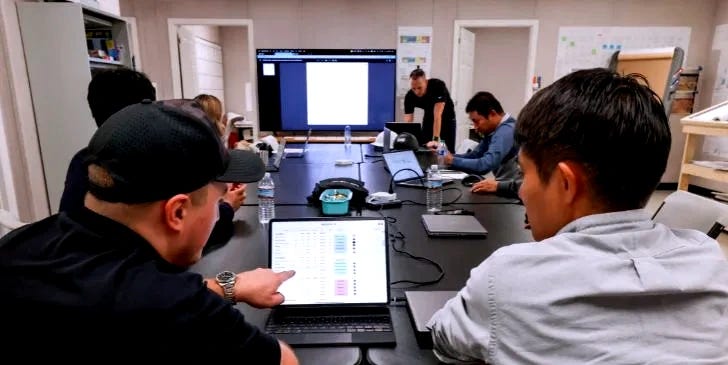The 6 Disciplines for Leading a Team
A field guide for new leaders moving from technical expert to team builder.
👋 Hey, Kyle here! Welcome to The Influential Project Manager, a weekly newsletter covering the essentials of successful project leadership.
Today’s Overview:
Moving into leadership marks a fundamental shift from being valued for your technical expertise to delivering results through others.
Most new leaders struggle with this transition, falling back on the individual contributor mindset that made them successful in the past.
We'll explore six core disciplines that help you make this shift successfully, building your capacity to develop others, create clarity, and lead high-performing teams.
🏗️ Presented by Outbuild!
Outbuild is designed for one thing: to make construction scheduling easy, connected, and effective. Here’s why top contractors rely on it:
✅ Easy to use: Drag-and-drop features and user-friendly layout mean your team can hit the ground running. No long training needed.
✅ Everyone has access: Let your trade partners, PMs, and PEs all log in, plan their work, and communicate directly.
✅ Seamless integration: Sync your scheduling and field planning effortlessly with Procore. Outbuild keeps all your project workflows in one place.
✅ Real-time reporting and analytics: Track project progress, delays, and resources with powerful analytics that help you make fast, informed decisions.
Outbuild helps you manage projects better, so you can focus on what truly matters.
👉 Book a live demo (30 day free trial included).
🛡️ The 6 Disciplines for Leading a Team
Filed under: Leadership & Managing People
The moment you step into a leadership role, everything changes.
The technical expertise that made you a star individual contributor suddenly takes a back seat to an entirely new challenge: delivering results through others.
It's a shift that catches many new leaders off guard. You're no longer just responsible for your own work - you're responsible for creating an environment where an entire team can succeed. You're expected to coach, motivate, and develop others while simultaneously hitting ambitious targets and navigating constant change.
The stakes are high. As a leader, you directly impact not just business results, but people's careers, engagement, and even their willingness to stay with the organization. Your team's culture, innovation, and customer relationships all flow from how effectively you lead.
But there's good news: Leadership is a skill and it can be learned. Through years of mistakes, successes, and mentoring others, I've found six core disciplines (Source: FranklinCovey) that separate exceptional project leaders from the rest.
Develop a leader’s mindset.
Hold regular 1-on-1s.
Set up your team to get results.
Create a culture of feedback.
Lead your team through change.
Manage your time and energy.
Master these, and you'll be equipped to deliver breakthrough results through others.
Here we go.
1. Develop a Leader’s Mindset.
“A good leader inspires a team to have confidence in the leader. A great leader inspires a team to have confidence in themselves.” - Richard Kovacevich
The shift from manager to leader begins with a fundamental change in how you see your role.
I remember my first week leading a team. A critical problem landed on my desk, and I immediately jumped in to solve it myself. After all, that's what made me successful before. My mentor pulled me aside and asked, "Are you building a team that depends on you for answers, or one that can solve problems without you?"
That conversation changed everything. Great leaders create space for others to step up. When team members come to you with problems, fight the urge to provide solutions. Ask questions that guide their thinking: "What approaches have you considered?" "What do you think is the best path forward?" "What support do you need?"
In practice, this means shifting the mind from:
"I must have the solution" to "My job is to ask the right questions"
"I'm responsible for the work" to "I'm responsible for the people doing the work"
"My expertise drives results" to "My ability to develop others drives results"
Your job is to develop problem-solvers, not solve every problem yourself. This takes patience and trust, but it's how you scale your impact and build a high-performing team.
2. Hold Regular 1-on-1s.
“Leadership happens one conversation at a time.” - Moon, Davis, Simpson, Merrill, Talent Unleashed
Regular one-on-ones are your most powerful tool for building trust and developing your team. Most leaders treat these as status updates. That's a missed opportunity.
The best one-on-ones feel like conversations, not meetings. Start by asking what's on their mind. You'll be amazed what surfaces when you create space for real dialogue. Listen for what energizes them and what causes friction. Probe deeper on their career aspirations.
Here are some simple 1-on-1 tips to draw out issues and interests:
Structure:
Schedule at least 30 minutes every month with each direct report.
Come prepared with topics to discuss, but let your team member lead the conversation.
Challenges, Opportunities, & Support:
What can I do to help with your work?
What are you most concerned about?
What’s your biggest challenge? Why?
What’s the biggest opportunity we’re missing out on?
What are we not doing that we should be doing?
Development Goals and Planning:
On a scale of 1–10, how happy are you working here?
What development areas do you want to work on this week?
What have you learned this last week?
Feedback:
I’ve been working on _______. How am I doing?
Make it a two-way street. Share your own challenges and what you're learning. Be human. When people see you as a real person who trusts them enough to be vulnerable, they'll reciprocate with honesty and openness.
3. Set up your team to get results.
“If you want to build a ship, don’t drum up the men to gather wood, divide the work, and give orders. Instead, teach them to yearn for the vast and endless sea.” - Antione de Saint-Exupery
Early in my career, I watched a brilliant project implode because the team didn't understand the "why" behind the work. They had detailed specifications but no context about how their piece fit into the bigger picture.
Great leaders paint that picture clearly. Help your team understand not just what needs to be done, but why it matters. Connect their daily work to meaningful outcomes. When people understand the purpose behind their efforts, they bring their full creativity and commitment.
Here’s my favorite framework for delegating:
State the WHY: Explain why the task is important and how it connects to the bigger goal.
State the WHAT: Be crystal clear: Use the “From X to Y by When” format to define success.
Discuss the HOW:
Guidelines: Define the guidelines—the standards and conditions that must be met.
Resources: Define the resources required to complete the work (people, budget, tools).
Accountability: Decide how to track progress and be accountable. Depending on the work, you might want to meet daily, weekly, monthly, or less frequently.
Consequences: Define specifically and measurably the benefits from successful achievement of the work, as well as what will happen if the work is not completed.
When delegating, give people ownership of outcomes rather than prescribing methods. Share what success looks like, provide resources and guidelines, then let them figure out the "how." You'll be amazed by the innovative solutions they discover.
4. Create a culture of feedback.
“Feedback lets team members know what you value. Frequent positive feedback reinforces the very best work they do.” - Catherine Nelson
Feedback shouldn't feel like a scheduled event. Make it part of your daily rhythm. When someone handles a client situation well, tell them specifically what worked and why it mattered. When you see behavior that needs adjustment, address it promptly and privately.
The key is making feedback feel like support rather than judgment. Share what you observe, discuss the impact, and explore solutions together. Ask questions like "What would make this easier next time?" or "How can I help you succeed here?"
And remember - feedback flows both ways. Regularly ask your team how you can better support them. When they give you honest feedback, act on it. Nothing builds trust faster than showing you're willing to grow too.
5. Lead your team through change.
“People don’t resist change; they resist being changed.” - Peter Senge
Change creates uncertainty, and uncertainty breeds anxiety. Your role as a leader isn't to eliminate these feelings - it's to help your team work through them productively.
Be aware of the emotional journey. People go through predictable stages: denial, resistance, exploration, and commitment. Your leadership approach should match their stage:
Denial: Provide clear, consistent communication
Resistance: Listen to concerns, acknowledge losses
Exploration: Offer training and support
Commitment: Celebrate progress, reinforce the change
Be transparent about what's changing and why. Acknowledge the challenges while maintaining confidence in your team's ability to adapt. Create space for questions and concerns. Most importantly, keep people focused on what they can control and influence.
Some team members will embrace change quickly, others will need time to process. Meet people where they are while maintaining momentum toward your goals. Small wins build confidence and create momentum.
6. Manage your time and energy.
“Leading your team effectively requires you to prioritize taking care of yourself.”
Leadership is demanding. To perform at your best over time, you need to manage your energy, not just your time.
Block time for what matters most - strategic thinking, team development, and maintaining perspective. Protect space between meetings to process and reflect. Plan your weeks intentionally rather than letting your calendar control you.
Take care of yourself physically and mentally. Exercise regularly, eat healthy foods, get enough sleep, and find ways to recharge during the day. Leadership is a marathon, not a sprint. Your team needs you at your best, not running on empty.
Final Thoughts
These disciplines reinforce each other. A leader's mindset helps you run better one-on-ones. Effective one-on-ones build the trust needed for honest feedback. Clear context and regular feedback help teams navigate change more successfully.
Start where you are. Pick one discipline to focus on first. Practice it consistently for a month. Notice what works and adjust your approach. Then build on that foundation by adding another discipline.
Remember, your growth as a leader directly impacts your team's success. Make time to develop these skills. Your team deserves your best, and these practices will help you deliver it.
The technical skills that got you here won't get you where you want to go. But by mastering these disciplines, you can create an environment where your team - and you - can thrive.
Until next week,
Kyle Nitchen
LAST WORD 👋
🎧 PODCAST
I recently had the opportunity to join the Constructing Tomorrow podcast with Siddhant Mehta to talk about leadership, project management, and the 7 archetypes. Check it out to hear our conversation.
Watch or listen to the full episode on here.

Whenever you're ready, there are 5 ways I can help you:
Get my first book! No Bullsh*t Project: A Project Manager’s Guide to Successful Project Leadership
Upgrade your scheduling software. Experience the future planning system for construction and real estate development. iPM subscribers can enjoy a 15% discount on first year license.
Get my full toolbox (free). Access 30+ software and hardware tools I'm using today.
Learn Takt Planning. Elevate your skills as a scheduler, planner, and lean builder with the Takt Planning & Control online course. Use code "Influentialpmtakt" for 30% off.
Advertise in my newsletter. Put your brand in front of 5,400+ construction project managers, leaders, and execs. (Booked out 5 weeks)







I love why, what and how. Did a course with Simon Sinek's company on 'start with why' and though it was so simple, yet so powerful!
That was one of the most impactful articles I’ve read this month on Substack. I’ve bookmarked in my browser, added it to my OneNote library named Motivation, and I plan to include these ideas into my consulting. Thank you so much!